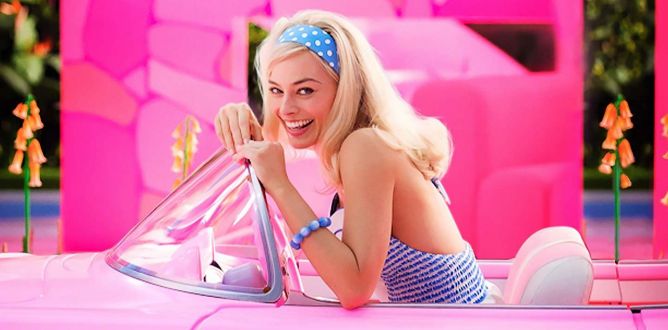Barbie (2023) Parent Guide
Creating a witty, campy, original film about plastic dolls is a genuine achievement.
Parent Movie Review
Barbie (Margot Robbie) is living her dream life in her bright pink dream house. She enjoys non-stop validation and entertainment in a world where her fellow Barbies can achieve anything – winning Nobel prizes, flying into space, or being President. Secure in the conviction that the success of Barbies inspires girls in the far-off “real” world, she’s able to party enthusiastically with Ken (Ryan Gosling) and her friends, at least, until she has sudden, irrepressible thoughts of death.
That’s not all. The next morning, Barbie wakes up with (horror of horrors) flat feet and is unable to drift down the levels of her stairless house. After she lands with a thud on the sidewalk, our protagonist visits Weird Barbie (Kate McKinnon) to uncover the cause of these disturbing phenomena. She learns that her answers can only be found in the real world, so she hops into her convertible to save Barbie Land. Unable to exist outside Barbie’s gaze, Ken insists on coming along, but their experiences in Los Angeles have dire consequences for their pink, plastic reality…
Let me be clear – Barbie is not a children’s movie. This production has nothing to do with the animated fairy-tale adaptations of years past and is not designed to entertain kids. This is a witty, campy, candy-coated critique of patriarchy that’s designed to make women chuckle, laugh out loud, and wince in recognition.
When Barbie arrives in LA, she discovers that not only do women not enjoy the female successes found in Barbie Land; some of them resent Barbie and her fellow dolls for fostering unreasonable expectations. Barbie is horrified to encounter both misogyny and patriarchy – but these attitudes give Ken a sense of visibility and respect. This cognitive divergence drives the rest of the plot and leads to an existential crisis for both characters and their entire community.
Jaded critic that I am, it’s not often that I get excited about a film, but I want to give two big thumbs-up to Greta Gerwig for co-writing and directing a movie that kept me guessing for its entire runtime. I honestly did not know how this movie was going to end, and that’s such a refreshing change. The script is also laugh-out-loud funny – Depression Barbie binge-watching Pride & Prejudice was a particularly rich moment for me, but theatergoers at my showing burst into laughter at frequent intervals.
There’s no doubt this film has been written for adult audiences (particularly women) but it can also be enjoyed by teens. Negative content is limited to minor innuendo, infrequent profanity, and some farcical violence. This is more than balanced by the movie’s positive themes. Barbie doesn’t just dissect the harms of structural misogyny; it drives home a strong message of female empowerment. When disillusioned Barbie moans that she’s “not smart enough to be interesting”, real world mom Gloria (America Ferrera) delivers an impassioned plea for female self-acceptance in a culture of unattainable, often contradictory expectations.
More impressively, this isn’t just a film about female disempowerment or rage. The script has the courage to look at the Kens and the consequences of ongoing marginalization, even when it results from cluelessness instead of malicious intent. As Barbie and Ken look beyond social constructs and examine their own interests and priorities, the movie becomes a tale of self-acceptance and maturation. Barbie is more than an advertorial for a child’s plaything: it’s a parable about individual agency. And stories don’t get much deeper than that.
Directed by Greta Gerwig. Starring Margot Robbie, Ryan Gosling, Simu Liu. Running time: 114 minutes. Theatrical release July 21, 2023. Updated June 29, 2024Watch the trailer for Barbie (2023)
Barbie (2023)
Rating & Content Info
Why is Barbie (2023) rated PG-13? Barbie (2023) is rated PG-13 by the MPAA for suggestive references and brief language.
Violence: There are chase scenes involving reckless driving. There are scenes of physical fighting involving hitting, kicking, and shoving. Male characters have a “war” in which sports equipment is used in place of weapons. A man is put in a headlock with the handle of a shovel. A woman punches a man for slapping her backside. A man hits himself hard enough to fall over.
Sexual Content: There is a coded reference to masturbation. Doll characters reference the “blobs” inside the male dolls’ jeans. There is some mild sexual innuendo. A main character refers to a “penis” and “vagina” and says that they don’t have any genitals. A man slaps a woman’s backside. A doll “grows” breasts when her arm is turned in circles. Song lyrics bemoan a character’s permanent state of virginity.
Profanity: A sexual expletive is bleeped out. There are a half dozen terms of deity and minor profanities.
Alcohol / Drug Use: None noted.
Page last updated June 29, 2024
Barbie (2023) Parents' Guide
What effect does Barbie and Ken’s relationship have on the rest of the film? What does their relationship say about power differentials? How does that influence the way Ken reacts to his experience in the real world? How do you think Barbie can remain unaware of Ken’s feelings? What does their relationship say about real-life relationships?
What do you think of Barbie’s choice at the end of the movie? Would you make the same decision? Why or why not?
Home Video
Related home video titles:
If you’re looking for a teen-friendly story of female empowerment, you can try Moxie. This Netflix production tells the story of a teen who launches an anonymous zine to protest the sexualized misogyny prevalent in her high school.
In Misbehaviour, a group of British feminists plan a protest against the 1970 Miss World beauty pageant to highlight the misogyny of their culture.
Ruth Bader Ginsberg’s long climb to the bench of the Supreme Court of the United States is depicted in On the Basis of Sex.

